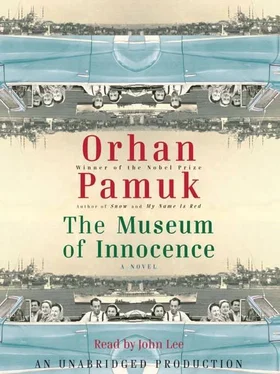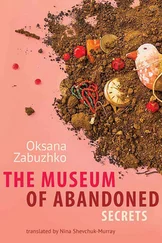“Fatma Hanım,” I called softly. “Have you seen an earring around here?”
The bright side room where my brother had lived until he married was scented with steam and lavender. Fatma Hanım had spent the afternoon ironing, and now, as she put away our handkerchiefs, shirts, and towels, she said she hadn’t seen “earrings or anything.” From the heap of unpaired socks in the basket, she pulled out one sock as if it were a naughty kitten.
“Listen to me, Claw Nails,” she said, using one of her nicknames for me when I was a child, “if you don’t cut your nails, you won’t own a single sock without a hole in it. I’m not darning these for you anymore-that’s final.”
“All right, Fatma Hanım.”
In the sitting room, in the corner that overlooked Teşvikiye Mosque, my father, covered by a spanking white apron, was sitting in a chair, with Basri the barber cutting his hair, and my mother, as always, sitting across from him, bringing him up to date.
“Come on over,” she said when she saw me. “I’m reporting the latest gossip.”
Basri had been feigning concentration on his work, but stopped trimming and, with a grin that showed his huge teeth, made it clear he’d been listening attentively all along.
“What’s the latest?”
“You know how Lerzan’s younger son wanted to become a race car driver? Well his father wouldn’t let him, and so…”
“I know. He crashed his father’s Mercedes. Then he rang the police saying it had been stolen.”
“All right then. But did you hear what Şaziment did to marry her daughter off to the Karahans’ son? Where are you going?”
“I’m not here for supper. I’m picking up Sibel. We’re invited out.”
“Go tell Bekri so that he doesn’t fry the red mullet tonight for nothing. He went all the way to the fish market in Beyoğlu today just for you. Promise you’ll come for lunch tomorrow so that we can eat them then.”
“I promise!”
The corner of the carpet had been rolled up to protect it from my father’s thin, white hair falling strand by strand onto the parquet floor.
I got the car out of the garage and as I bumped over the cobblestone streets I turned on the radio, tapping my fingers on the steering wheel in time with the music. In an hour I had crossed the Bosphorus Bridge and was in Anadoluhisarı. Sibel heard me and ran out to the car seconds after I had honked the horn for her. The first thing I said was that the woman who had died in the crash the day before had once been Zaim’s lover (“You mean ‘ You-Deserve-It-All Zaim,’” she said with a smile); then I told her the whole story.
“Her name was Belkıs; she was a few years older than me, thirty-two or thirty-three, I guess. She came from a poor family. After she entered society, her enemies began to gossip about her mother’s headscarf. In the late 1950s, when Belkıs was a lycée student, she’d met a boy at field day celebrations of the nineteenth of May, and they fell in love. This boy, Faris, was her age, the youngest son of the Kaptanoğlus, who had, as you know, made a fortune in shipping by then, to become one of Istanbul ’s richest families. This romance between the rich boy and the poor girl was right out of some Turkish film and it went on for years. Their passion was so great or they were so stupid that these teenagers were making love and flaunting it. Certainly they should have married, but the boy’s family convinced themselves that the poor girl had surrendered her virtue just to trick him into marriage, and that everyone knew this, so they opposed the match. It’s clear that the boy lacked the strength, the cast of mind, and the personal income to stand up to his family, take the girl by the hand, and marry her. So the family’s solution was to pack the boy off to Paris with the girl to live out of sight as an unmarried couple. Three years later because of drugs or despair the boy somehow died in Paris. Instead of running off with a Frenchman and never returning to Turkey, as might be expected in such situations, Belkıs returned to Istanbul, and launched herself into affairs with a string of other rich men, enjoying quite a colorful love life, as she drew the silent envy of other society women. Her second lover was Sabih the Bear; when she left him, she had an adventure with the eldest Demirbağ boy, who was then on the rebound from another romance. Because her next lover, Rıfkı, was similarly afflicted, society men began to refer to her as the ‘Consoling Angel,’ and they all dreamed of having affairs with her. As for all those rich married women who had slept with no one in their lives but their husbands, or at the most taken a lover in shame and secrecy, never with much satisfaction-when they saw this Belkıs openly courting the most eligible bachelors, to say nothing of her secret married lovers, they were so jealous they would have found a way to drown her in a spoonful of water, given the opportunity. But no need. As hard living had already taken a toll on her looks and as she was short of funds it was becoming a struggle to keep herself presentable. So you could say the day of drowning was fast approaching. You could say that the accident put this woman out of her misery.”
“It surprises me that not a single one of these men would marry her,” said Sibel. “It means that no one ever loved her enough to take the plunge.”
“Actually, men fall madly in love with women like that. But marriage-that’s something else. If she had been able to marry the Kaptanoğlu boy, Faris, right away, and without having slept with him, people would have been quick to forget how poor her family was. Or if Belkıs had come from a wealthy family, they would have overlooked her not being a virgin when she married. Because she didn’t take account of the rules and went on enjoying her sex life, all those society women, envious just a moment ago, began calling her the ‘Consoling Whore.’ But maybe for that very reason, because she gave herself to the first boy she ever loved, gave herself to her lovers without hiding it from anyone, perhaps we should have some respect for Belkıs, too.”
“Do you feel respect for her?” asked Sibel.
“No, to be honest, I found the deceased repulsive.”
The party-I forget the occasion-was on the long concrete patio of a house on the Suadiye shore. Sixty or seventy people were standing there with drinks in hand, conversing in near whispers as they looked to see who was there, who was just arriving. Most of the women seemed concerned about the length of their skirts, with the ones in short skirts uneasy in the extreme, imagining their legs were too short or too thick. Perhaps this was why, at first sight, they all looked like awkward, surly bar girls. Right next to the patio, on the jetty, a big sewer was emptying into the sea, producing quite a smell for guests as white-gloved waiters wandered among them.
After wandering around a bit myself, I met a “psychiatrist” who had just returned from America and opened an office; he gave me his new card the moment we met, and at the incitement of a vivacious middle-aged woman, he offered up a definition of love to the cluster of guests who were discovering him: When one forsook all other opportunities, wishing only to make love consistently with the same person, this feeling, which he held to be conducive to happiness, was “love.” After the discourse on love, a mother, having introduced me to her beautiful eighteen-year-old daughter, sought my advice about where to send the girl to university, so as to spare her the Turkish universities’ continual politically motivated boycotts. The conversation began with a discussion of a report in that day’s papers about how, to prevent the theft of the question booklets for the university entrance exams, the printers had been subject to a prolonged sequestration.
Читать дальше












